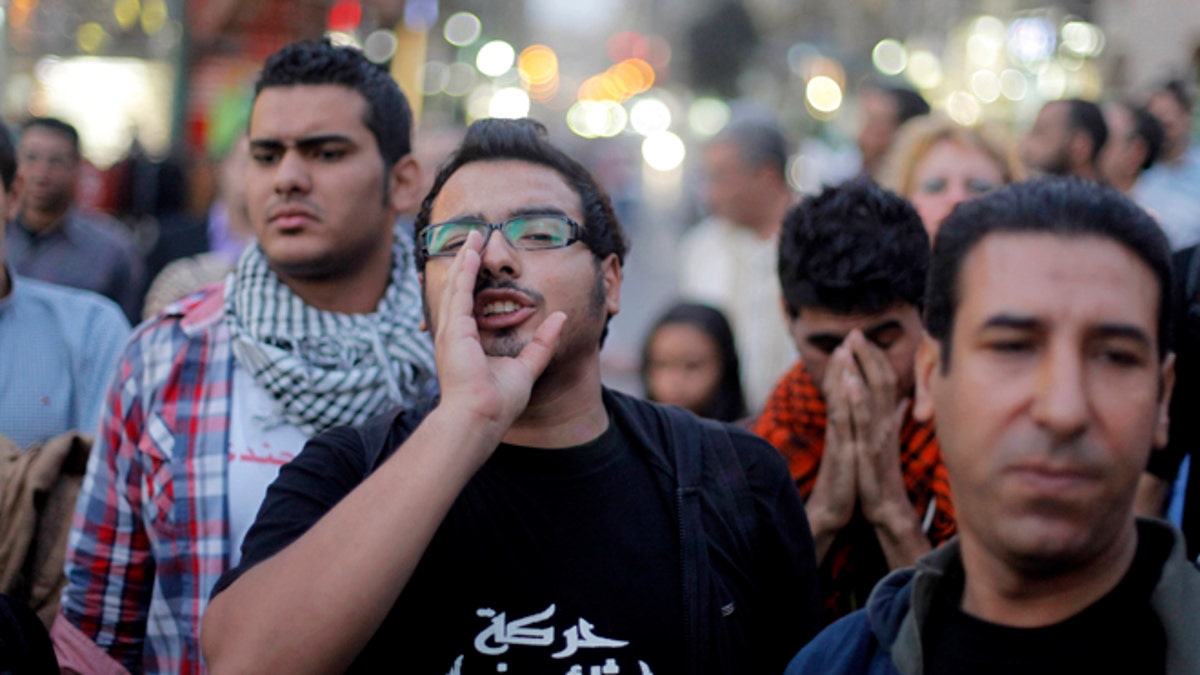
Nov. 28, 2013: An Egyptian protester chants slogans in Talaat Harb Square in Cairo, Egypt, against the issuance of a new law regulating demonstrations.
CAIRO – Egyptian security forces arrested a prominent political activist Thursday night over inciting a demonstration in defiance of a new law heavily restricting protests in the country, his family said.
The arrest of Alaa Abdel-Fattah, a blogger who rose to prominence in Egypt's 2011 revolution, quickly dominated social media. His previous detention sparked protests against the military, which appeared likely again as recently quiet liberal and secular groups have expressed increasing alarm over the military-backed government since it enacted the new protest law this week.
Meanwhile, police used tear gas and water cannons Thursday to disperse protesting students and supporters of the country's ousted Islamist president, sparking clashes that killed one person
Abdel-Fattah's father, prominent lawyer Ahmed Seif al-Islam, told The Associated Press that security forces raided his son's home Thursday night in Cairo. His father said that Abdel-Fattah's wife was beaten during the raid and that authorities seized laptops from the house.
An Interior Ministry official later confirmed police arrested Abdel-Fattah over the warrant, but offered no other details. The official spoke on condition of anonymity as he was not authorized to speak publicly to journalists.
After the raid, Abdel-Fattah's wife, Manal Bahy Eldin, wrote on Twitter: "If police beat me up while I am in my home, what would they do with Alaa? I am very worried about him."
Egypt's prosecutor general had issued a warrant for Abdel-Fattah's arrest and that of another youth leader for allegedly inciting a demonstration Tuesday, two days after interim President Adly Mansour enacted the new protest law. Among the new rules in the law, it requires three-day prior notice to the Interior Ministry for protests to take place, while also setting prison terms and high fines for violators.
After the warrant was issued, Abdel-Fattah said he would turn himself in on Saturday to authorities.
"I don't deny the charge," he wrote in a statement. "It's an honor to hold responsibility for people's rallies in defiance to legalizing the return of" the rule of Hosni Mubarak, the longtime president ousted in Egypt's 2011 revolution.
The protest law comes as part of efforts by authorities to break the back of near-daily protests by Islamist demonstrators over the July 3 popularly backed military coup that toppled President Mohammed Morsi. While granting police more power, they also galvanized liberal and secular group dissatisfaction with the military.
Abdel-Fattah previously was detained for two months in late 2011 by military authorities over allegations he attacked soldiers carrying out a bloody crackdown on protesters. He was later released without charge. He also was accused of inciting violence during clashes between opponents and supporters of Morsi before his ouster.
Abdel-Fattah's sister, Mona Seif, was among those women dumped in the middle of the desert this week after being arrested at a protest.
Earlier Thursday, Morsi supporters protested at Cairo University. The demonstrators later left the university's campus and marched down a major street, sparking a confrontation with police.
At least one student was killed in the clashes, said a security official who spoke on condition of anonymity because he was not authorized to speak to journalists. Eight were injured by either tear gas inhalation or during clashes with security forces, Health Ministry official Khaled el-Khatib said.
Reacting to the ongoing protests, Interior Minister Gen. Mohammed Ibrahim said security forces will "confront any violation and will face with all decisiveness any attempt to cut roads, block public facilities, hinder citizens' movement or obstruct their interests."
Meanwhile, activists arrested during protests Tuesday chanted "down with military rule" as they appeared in court for a hearing. They said they planned to go on hunger strike until the government cancels the law. A judge ordered them held 15 more days.
In southern Egypt, a security official said Muslim residents from a village called al-Hawarta in Minya province fought with Christians from a neighboring village over a home being built by Christians between their two villages. The official said one Christian and two Muslims were killed, as Muslims also set fire to Christian homes.
The official spoke on condition of anonymity as he was not authorized to speak to journalists.
Christians compose nearly 10 percent of Egypt's population and have suffered decades of discrimination under successive governments.
